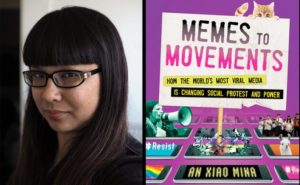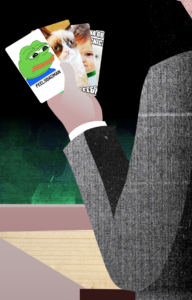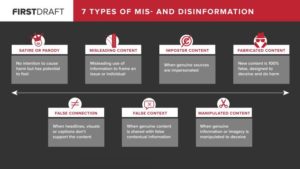But today, as disinformation begins to spread ahead of the 2020 presidential vote, Facebook again is discussing “microtargeting” and weighing whether to restrict a set of advertising tools so powerful that, critics say, it may threaten democracy itself…. Very narrow targeting, say disinformation experts, fractures political understanding far more severely than the traditional red-blue partisan divide.
“Instead of two Americas, you’re potentially looking at hundreds of thousands of Americas,” said Alex Stamos, the former Facebook security chief, now head of the Stanford Internet Observatory, which studies disinformation campaigns. “I don’t think our democracy can survive that kind of Balkanization of the electorate.”
 Propaganda warfare is increasingly shaping narratives, policies and lives around the world, notes Coda Story. If you’d like to read more about why people spread falsehoods online, read Eduard Saakashvilii’s article about a book – An Xiao Mina’s Memes to Movements: How the World’s Most Viral Media is Changing Social Protest and Power – which examines the real life impact of online behavior, Mariam Kiparoidze adds.
Propaganda warfare is increasingly shaping narratives, policies and lives around the world, notes Coda Story. If you’d like to read more about why people spread falsehoods online, read Eduard Saakashvilii’s article about a book – An Xiao Mina’s Memes to Movements: How the World’s Most Viral Media is Changing Social Protest and Power – which examines the real life impact of online behavior, Mariam Kiparoidze adds.
“It’s tempting,” she writes, “to think of fake news as a series of falsehoods.” Fact-checking does nothing to address the fundamental reasons people decide to share lies.
Democracies should develop and establish expertise in hybrid and political warfare across strategic, operational, and tactical levels of leadership in the civil and military wings of government, argues Andrew Hastie, the chair of the Australian Parliament’s Joint Intelligence and Security Committee.
 We must build an array of instruments, including cyber, diplomatic, information, and media capabilities, he writes in an essay for the Henry Jackson Society and Konrad Adenauer Stiftung’s report The Art of Deceit: How China and Russia Use Sharp Power to Subvert the West. These are important for informing domestic public about the nature and scale of the challenge, but also for exposing to international publics the activities of authoritarian regimes. These activities include corruption, espionage, fake news, and human rights abuses. Civil society has a crucial role to play in this. Think tanks and investigative reporters, particularly, are critical in exposing subversive activities undertaken by foreign authoritarian powers. …RTWT
We must build an array of instruments, including cyber, diplomatic, information, and media capabilities, he writes in an essay for the Henry Jackson Society and Konrad Adenauer Stiftung’s report The Art of Deceit: How China and Russia Use Sharp Power to Subvert the West. These are important for informing domestic public about the nature and scale of the challenge, but also for exposing to international publics the activities of authoritarian regimes. These activities include corruption, espionage, fake news, and human rights abuses. Civil society has a crucial role to play in this. Think tanks and investigative reporters, particularly, are critical in exposing subversive activities undertaken by foreign authoritarian powers. …RTWT
One of the recent major targets for such global propaganda campaigns is the Hong Kong protest movement, adds China Digital Times.* In August, Twitter announced the discovery of almost 1000 accounts which were, “deliberately and specifically attempting to sow political discord in Hong Kong.” The upcoming elections in Taiwan have also been a focus of official mainland propaganda and disinformation campaigns, which internet users in Taiwan are beginning to fight back against.
Authoritarian interference operations that exploit economic and financial channels have thrown Western governments off balance, according to Alliance for Securing Democracy Senior Fellow Josh Kirschenbaum. Targeting foreign banks indirectly involved in money laundering schemes is crucial to shifting back the balance of power.
Microtargeting

Claire Wardle of First Draft
Facebook also allows microtargeting by letting advertisers upload lists of people — by name, phone number, email address or other identifying characteristics — to create a matched “Custom Audience” of Facebook users. Advertisers that create “Custom Audiences” also can create a secondary list called “Lookalike Audiences” of people with similar characteristics, the Post’s Timberg adds.
“No other advertising platform in history comes close to having Facebook’s capabilities,” said Jonathan Albright, research director of the Tow Center for Digital Journalism at Columbia University. “If there was no Custom Audiences, then we probably wouldn’t be talking about microtargeting right now.”
The European Values Center for Security Policy and Wilfried Martens Centre for European Studies are organizing the 6th iteration of STRATCOM SUMMIT in Prague on 13 – 15 May 2020. The focus of the conference will be:
• European responses to Russian malign influence & disinformation
• Policy options for countering Chinese digital totalitarian
• Raising costs for Russian and Chinese influence in Europe
• Analyzing current and potential nexus of Russian and Chinese influence cooperation.
*A partner of the National Endowment for Democracy.


 As Facebook sought to recover from its disastrous 2016 election season, company officials debated ways to curb distortions and disinformation on the platform. One of the most potentially powerful — limiting advertisers’ ability to target narrow slices of voters with political messages — struggled to find support and was abandoned, say people familiar with those discussions,
As Facebook sought to recover from its disastrous 2016 election season, company officials debated ways to curb distortions and disinformation on the platform. One of the most potentially powerful — limiting advertisers’ ability to target narrow slices of voters with political messages — struggled to find support and was abandoned, say people familiar with those discussions, 





